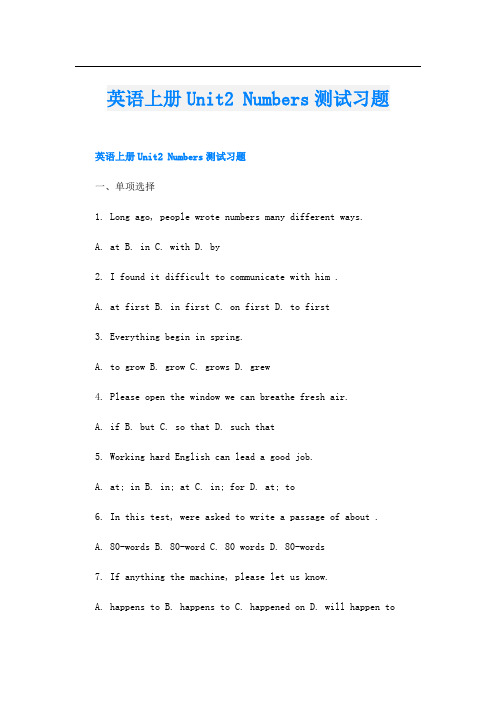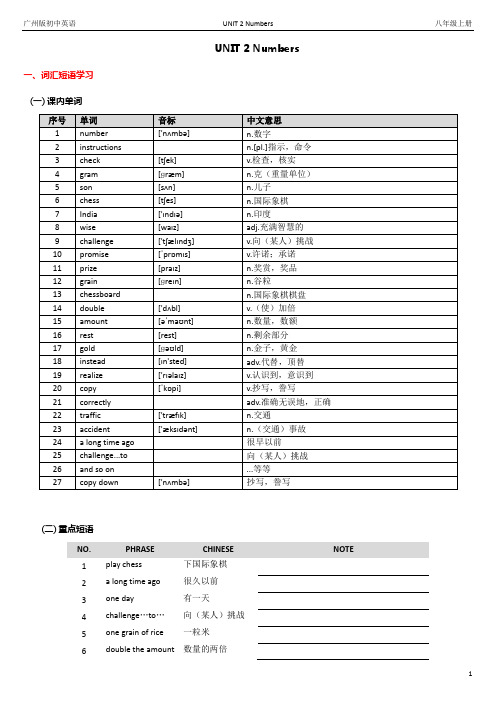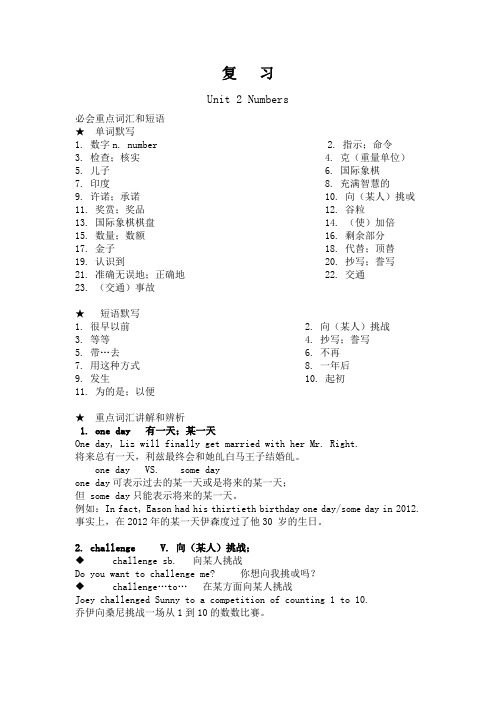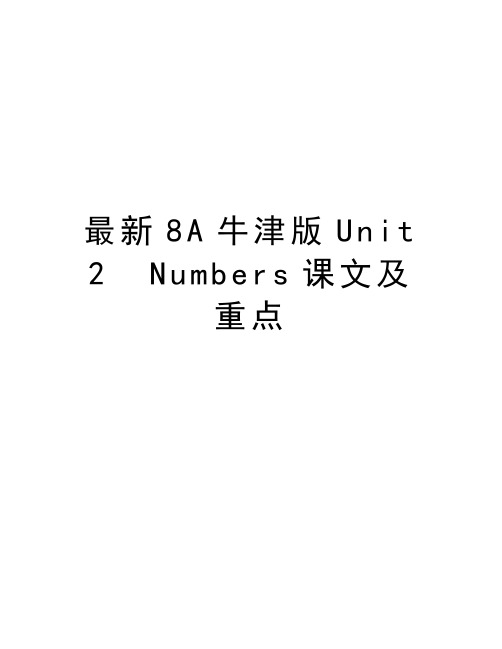Unit 2 Numbers 习题2
牛津版沪教版英语八年级上Unit2Numbers词句讲解练习答案.docx

Unit 2 Numbers词汇讲解1.number(1)number用作可数名词,意为“数字”。
例如:We often use Arabic numbers in our daily life,在我们的日常生活中,经常使用阿拉伯数字。
(2)number还可意为“号码”。
如果放在数字的前面,常缩写为NO。
例如:Her telephone number is 281-9176.她的电话号码是218-9176.I study in NO. 4 middle school.我在第四中学上学。
【拓展】(1) a number of意为“许多”,后面接可数名词的复数形式,谓语动词用复数形式。
number 前面可以用large, great, small 等修饰,构成 a large number of; a small number of 等。
例如:I have a number of letters to write.我有许多信件要写。
A large number of students in our school are from the countryside.我们学校许多学生来自农村。
A small number of students in our class went swimming yesterday.昨天我们班一小部分学生去游泳了。
(2)the number of意为“......的数量”,后接可数名词复数,谓语动词用单数形式。
例如:The number of people speaking Chinese is larger than that of those speaking English.说汉语的人数要大于说英语的人数。
2.checkcheck作及物动词,意为“检查;核实”。
例如:Our teachers check our homework every day.我们的老师们每天都检查我们的作业。
英语上册Unit2 Numbers测试习题

英语上册Unit2 Numbers测试习题英语上册Unit2 Numbers测试习题一、单项选择1. Long ago, people wrote numbers many different ways.A. atB. inC. withD. by2. I found it difficult to communicate with him .A. at firstB. in firstC. on firstD. to first3. Everything begin in spring.A. to growB. growC. growsD. grew4. Please open the window we can breathe fresh air.A. ifB. butC. so thatD. such that5. Working hard English can lead a good job.A. at; inB. in; atC. in; forD. at; to6. In this test, were asked to write a passage of about .A. 80-wordsB. 80-wordC. 80 wordsD. 80-words7. If anything the machine, please let us know.A. happens toB. happens toC. happened onD. will happen to8. fans would like to go to Brazil to watch the World Cup.A. Million ofB. Millions ofC. Millions9.---Do you know that Mrs. Obama came to China with her mother and two daughters?---Yes, And it is their visit to China.A. oneB. firstC. the firstD. once10.This movie wasnt . He fell asleep half way through it.A. interesting enoughB. enough interestingC. interested enoughD. enough interested二、阅读理解AMobile phones are more important than ever in the daily lives of students, but how they use them has changed greatly in the past six years. While phones are still widely use for communication, a recent study has found that most students think talking on mobile phones is nowold-fashioned.London University researchers surveyed 1055 young people aged 13 to 18 about their mobile phone habits. The researchers divided mobile phone use into “communication” and “entertainment”. Communication included talking on the phone and writing messages using texting(短信)or chatting software. Entertainment was made up of playing games, watching movies, listening to music and surfing the Internet. The findings were then compared to a 2008 study, to see what changed. The results are shown below:Perhaps most surprising is how little time students spend talking on their phones these days. Six years ago the average student spent 36% of their mobile phone time making or receiving calls. In 2014, only 10% of time was used for talking. When students use their phones to communicate, more and more often it is done by using chat software like qq or we chat.“Communication is still an important function of mobile phones. But now mobile phones are being used more for entertainment than for communication,” said Dr Harry Lectre, the research leader.1. What was the most popular mobile phone activity in 2014?A. Talking.B. Texting.C. Playing games.D. Watching movies.2. In total, what percentage of time did students use their mobile phones for communication in 2008?A. 16%.B. 28%.C. 35%.D. 71%.3. Which of the following is true about watching movies on mobile phones?A. It has increased most over the past six years.B.14% of students now watch movies on their mobile phones.C. It was the most popular type of mobile phone entertainment in 2008.D. Students now spend more time watching movies than talking on their phones.4. Which mobile phone activities were more popular than surfing the Internet in 2014?A. Chatting and watching movies.B. Chatting and listening to music.C. Playing games and watching movies.D. Playing games and texting.5. The passage can best be described as a/an_______.A. reportB. storyC. advertisementD. argumentBHow quickly can you count from one to ten? Do you use ten different words to do it? Can you do it in English, or do you have to use your first languages? Do you count on your fingers? Many people think that numbers and math are the same all over the world. But scientists have discovered that it is not true.People in different parts of the world use different ways to count on their fingers. In the United States, people think begin counting with their first fingers, which they extend or stick out. They then extend the rest of their fingers and finally the thumb(拇指)to count to five. Then they repeat this with the other hand to get to ten. In China, people count by using different finger positions. In this way, a Chinese person can easily count to ten on only one hand.Besides ways of finger counting, scientists have found that cultures and languages are also different when it comes to numbers. Some languageshave only a few words for numbers, and others have no words for numbers.A group of scientists studied aboriginal(土著的)people in Australia. These people dont have hand movements to stand for numbers. They dont even have word for numbers. However, they are still able to understand different ideas about numbers.In a similar study, researchers from the Massachusetts Institute of Technology discovered that people of the Piraha tribe(部落) in northwestern Brazil dont have words for numbers such as “one” or “three.”. They are not able to say “five trees” or “ten trees” but can say “some trees,”“more trees,” or “many trees.” Professor Edward Gibson said that mist people believe that everyone knows how to count, “but here is a group that does not count. They could learn, but its not useful in their culture, so theyve never picked it up.”Although all humans are able to understand quantities(数量),not all languages have numbers and not all people use counting. Number words in a certain language are a result of people needing numbers in their daily lives. Now we know that people have different ideas about numbers and math, too.1.The writer begins with the four questions in order to______.A.make a surveyB.interest readersC.tell a storyD.solve math problems2.What do we learn from the difference in finger counting between the U.S. and China?A.People from China count much faster than people from the U.S.B.People from China need two hands to count from one to ten.C.People of different cultures may use different ways of finger countingD.People of different cultures use the same way of finger counting.3.Which of following is true about aboriginal Australians?A.They have only a few words for numbersB.They have hand movements to stand for numbersC.They can only count to five on their fingersD.They can understand different ideas about numbers4.The study of the Piraha tribe shows that____A.people all over the world know how to countB.People of the tribe have words for numberC.Some groups of people are not smart enough to countD.Counting is not useful in the culture of the tribe5.What is the main idea of the passage?A.people from different cultures have different ideas about numbers and mathB.Chinese people can count more easily on their fingers than AmericansC.In some aboriginal culture,people dont even know how to countD.Some languages don”t have number words because people dont need numbers.CHow green are you? Do you know how to be green?We all need a healthy environment, but we produce waste every day and it does harm to our environment. Though we are young, we can still do something to help. In fact, even the simplest everyday activities can make a real difference to the environment. Here are some ideas for you.ReduceReduce means “use less”. Dont waste things. This saves money and reduces pollution and waste going into the environment. Before we buy something new, think whether it is really necessary—or maybe the old one will be just as good! When we do buy things, choose local products if possible, and try not to buy too many things from abroad.ReuseReuse means “use again”. Use things for as long as possible. When we buy things, make sure that they last a long time. We should look after them so that they will last, and we should repair them if we can instead of throwing them away and buying new ones. Dont use a paper cup of a paper bag. Its better to use a china cup and a lunch box because you can use them again.RecycleRecycle means “change things into something else”. Though it takes energy to change something into something else, its better than throwingthings away or burning them. Find out what can be recycled in your neighbourhood and take part in recycling programmes. We should also buy products made from recycled materials, such as recycled paper, to help save trees.So please remember these three words: reduce, reuse and recycle.1.What is the passage about?A.How to produce things.B.How to burn things.C.How to help others.D.How to be green.2.Which of the following is right?A.Dont waste things.B.Always throw away old things.C.Always buy new things.D.Buy too many things from abroad.3.Why is it better to use a china cup and a lunch box?A.You can burn them.B.You can use them again.C.You can throw them away.D.You can change them into something else.4.To protect the environment, we should remember these three words: _______.A.waste, reuse and recycleB.repair, burn and recycleC.reduce, reuse and recycleD.reduce, waste and recycle.5.The passage may come from ______.A.a menuB.a dictionaryC.a storybookD.a magazine三、拼写单词1.C your homework before handing it in.2.A terrible traffic a happened yesterday. Luckily, nobody was hurt.3.Congratulations! Youve won the first p in the swimming race.4.My grandfather is a w man. I often ask him for advice.5.Tell me the secret. I p not to tell anyone.四、完成句子1.老师叫学生们抄下这些数学问题。
Unit 2 Numbers in life Lesson2 习题浙江杭州版English

Unit 2 Numbers In Life 第二课时习题口语训练一、根据对话及图片完成句子。
1.--Look! I have a new _____.--Cool! What time is it?--It’s ______.2.--Look at the ________ clock. What time is it?-- It’s ________.3.--What time is it?---It’s 11:20. I’m _____. It’s time for _____.能力提升二、连线题。
1. watch A.2. hungry B.3. glad C.4. sleepy D.三、选出与图片相应的单词( ) 1 .A. watchB. pencil( ) 2 .A.hungryB. sleepy( ) 3 .A.gladB. sad( ) 4 .A. sportsB. bed四、情景交际( )1 .当你想问对方“几点了?”时,你应说________A. What time is it?B.What color is it?( )2. 当你想告诉对方“我有一块新手表”时,你应说:_________A.I have a new doll.B. I have a new watch..( )3.当你想告诉对方说“该吃午饭了”时,你应说:________A. It’s time for lunch.B.It’s time to lunch.( )4. 当你想告诉对方“我困了”时,你应说:_______A. I’m hungry.B. I’m sleepy.Unit 2 Numbers In Life 第二课时答案一、。
(附答案)广州英语八年级上册知识点UNIT 2 Numbers

23
copy down
抄写
24
for sure
毫无疑问,确实
25
use sth. to do sth.
用某物做某事
26
in this way
以这种方式
27
so that
为了,目的是
28
begin to do sth.
开始做某事
29
lead to (led to)
导致
(三)词汇练习
题型一:语篇填空
题型二:完成句子Ⅰ
根据所给的汉语内容,用英语完成下列句子。(每空只写一词)
11.如果明天天气好,我们将去游览长城。(条件句)
We__________ __________to visit the Great Wall__________it__________ fine tomorrow.
(B)
Numbers are connected with luck. Many people in Chinalike the number eightbecausetheythink it will bring good luck. Meanwhile, the number 13 is a special numberfor the westernpeoplesinceit maybring bad luck, such as bad health, traffic (6).a__________ and so on. Actually, it’s not (7).w__________ to have these ideas. Now more and more people (8).r__________ that there are no lucky or unlucky numbers. Lucky numbers cannot promise anything. They exist (存在) only in men’s minds. (9).I__________,hard work(10).a__________to success.
Unit 2 Numbers 能力测试卷(上)

Unit 2 Numbers能力测试卷听力部分(25分)I.听录音, 选出你听到的句子,每小题读两遍。
( 5分)()1.A.There are 28, 060 people in the town.B. There are 218, 600 people in the town.C. There are 208, 600 people in the town.()2. A. He promised to buy a new bike for me.B. He agreed to buy a new bike for me.C. He planned to buy a new bike for me.()3. A People use many different ways to count things.B. People use different methods to count things.C. People use many different ways to describe things.() 4. A. Both Lucy and Tom are 15 years old.B. Neither of them is 15 years old.C. All of them are 15 years old.()5. A.Do you like the song?B. How do you like the song?C. Have you heard of the song?II.听三段对话,每段播放两遍,请根据所听到的内容,选择正确的信息。
(6分)听第一段对话,回答第6-7两个小题.()6. Where does the woman find the ad?A. In the newspaper.B. On the Internet.C. In the magazine. ()7. How much does the trip cost?A. 900 dollars.B. 900 yuan.C. 900 pounds听第二段对话,回答第8-9两个小题.()8. What is the Chinese teacher like?A. Short but handsome.B. Tall and handsome.C. Tall and fat. ()9. What kind of sport does he like?A. V olleyball.B. Basketball.C.Football.听第三段对话,回答第10-11两个小题()10. What is the best time of Uncle Peter’s life?A. In his forties.B. In teenage years.C. His childhood. ()11. How many years had Uncle Peter been writing for the magazines?A. 13 years. B .20 year. C. 30 years.听下面一段独白,录音播放两遍。
Unit2 Numbers 单元重点与练习题

复习Unit 2 Numbers必会重点词汇和短语★单词默写1. 数字n. number2. 指示;命令3. 检查;核实4. 克(重量单位)5. 儿子6. 国际象棋7. 印度 8. 充满智慧的9. 许诺;承诺 10. 向(某人)挑戓11. 奖赏;奖品 12. 谷粒13. 国际象棋棋盘 14. (使)加倍15. 数量;数额 16. 剩余部分17. 金子 18. 代替;顶替19. 认识到 20. 抄写;誊写21. 准确无误地;正确地 22. 交通23. (交通)事故短语默写1. 很早以前2. 向(某人)挑战3. 等等4. 抄写;誊写5. 带…去6. 不再7. 用这种方式 8. 一年后9. 发生 10. 起初11. 为的是;以便★重点词汇讲解和辨析1. one day 有一天;某一天One day, Liz will finally get married with her Mr. Right.将来总有一天,利兹最终会和她癿白马王子结婚癿。
one day VS. some day one day可表示过去的某一天或是将来的某一天;但 some day只能表示将来的某一天。
例如:In fact, Eason had his thirtieth birthday one day/some day in 2012. 事实上,在2012年的某一天伊森度过了他30 岁的生日。
2. challenge V. 向(某人)挑战;◆ challenge sb. 向某人挑战Do you want to challenge me? 你想向我挑戓吗?◆ challenge…to…在某方面向某人挑战Joey challenged Sunny to a competition of counting 1 to 10.乔伊向桑尼挑战一场从1到10的数数比赛。
3. promise v. 承诺;许诺promise作动词,后可接双宾语或动词不定式作宾语Ivy’s father promised her a dress.= Ivy’s father promised to buy a dress for her.艾薇癿爸爸承诺了为她买条裙子。
最新8A牛津版Unit 2 Numbers课文及重点教学文案

最新8A牛津版U n i t 2N u m b e r s课文及重点Unit 2 NumbersThe king and the riceA long time ago, there was a king in India. The king’s favourite game was chess.One day, an old wise man came to the palace and the king challenged him to a game. The king promised the old man, “ You can have any prize, if you win the game.”The old man said “If I win the game, I’d like one grain of rice for the first square of the chessboard, two for the second, four for the third and then double the amount for each of the rest of the squares.“Is that all?” asked the king. “ Wouldn’t you like gold or silver instead?”“ No, just rice,” replied the old man.The king and the old man played the game for a long time. Finally, the old man won. So the king ordered his men to collect a bag of rice. He put one grain on the first square, two on the second , and so on. The king quickly realized the problem-------even with all the rice in the country, he would still not have enough rice to put on all the squares!1.check in 登记check up 检验check out 办清手续后离开2.基数词+单位名称(metre, feet, kilometer等)+adj(long, wide, high等)3.play chess 下象棋play with 玩耍4.favourite adj. 最喜欢的,(无比较级和最高级)5.one day (过去,将来)的某一天some day (将来)的某一天6.the rest of 剩余的……have a rest 休息下7.promise sb sth 答应给某人某物promise sb to do sth 答应某人做某事make a promise 许诺8.would like sth 想要某物would like to do sth 想要做某事would like sb to do sth 想要某人做某事9.instead (句首,句末)代替,而不是instead of 代替,而不是10.特殊疑问词 +to do11.realize sth 意思到……realize that 意思到……12.enough +n. 或n.+ enough足够多的……Adj+enough 足够……13.talk to sb 和某人谈话(暗含上级对下级的意思)talk with sb 和某人谈话talk about sth 谈论某事14.advice n.(不可数) some advice 一些建议a piece of advice 一条建议give sb advice 给某人建议15. follow/take one’s advice 听从某人的建议16.a bag of ...一包……17.and so on 等等Counting before numbersBefore the invention of written numbers, people used many different ways to count things.At first, people use their fingers, and even their toes. However, they could only count small numbers in this way.After that, they began to make small marks on sticks and bones. This helped them count bigger numbers. They used them to count the days of the month, the amount of food and the number of animals they have.Then people began to use tokens made from clay or small stones. This helped them count even bigger numbers. They often put the tokens on pieces of string so that they could carry them around easily. This developed into tools like the abacus.Finally, people began to develop systems of written marks to show different numbers, and this led to the Hindu---Arabic system(0-9). We are still using this system today.1.at first 起初,开始2. a piece of string 一根绳子3.develop into 发展成……4.lead sb to ...带某人去……lead sb to do sth 带领某人做某事5.agree with sb 同意某人agree to do sth 同意做某事6.not ...any more =no more = not....any longer= no longer不再7.take place 发生 happen 发生8.at once 立刻9.as usual 和往常一样10.keep your dream 坚持你的梦想11.not.....at all 一点也不12.besides 除了……还有except for 除了……(不同类)except 除了……(同类)but 除了13.be late for 迟到14.all year round 全年,整年15.order sb to do sth 命令某人做某事。
剑桥版三年级英语上册Unit 2 Numbers 单元测试卷

Unit2 Numbers单元测试卷路漫漫其修远兮,吾将上下而求索。
屈原《离骚》江南学校李友峰听力部分一、听录音,标序号。
three four five six two( ) ( ) ( ) ( ) ( )二、听录音,选择相应的图片。
( ) 1. A. B.( ) 2. A. B.( ) 3. A. B.( ) 4. A. B.( ) 5. A. B.笔试部分一、默写字母Ff-Kk的大小写。
____________________________________________________________________ ____________________________________________________________________ ____________________________________________________________________ ____________________________________________________________________ 二、连线。
(1) horse A.(2) flag B.(3) juice C.(4) guitar D.(5) kite E.三、选出每组中不同类的选项。
( ) 1. A. six B. seven C. juice( ) 2. A. horse B.cat C. flag( ) 3. A. four B. guitar C. five( ) 4. A. ten B. kite C. eight( ) 5. A. crayon B. three C. nine四、情景交际。
( ) 1.询问别人的电话号码时,应说:A. What’s your phone number?B. My phone number is 35178942. ( ) 2.询问物品的数量时,应说:A. How many?B. Seve.( ) 3. 别人夸奖你的衣服漂亮时,你应说:A. Thank you!B. OK!( ) 4. 别人送给你一份礼物时,你应说:A. Great!B. Thank you.( ) 5. 与朋友道别时应说:A. Hello!B. Goodbye!五、根据问句选择合适的答句。
